JEEP WRANGLER 2023 Owners Manual
Manufacturer: JEEP, Model Year: 2023, Model line: WRANGLER, Model: JEEP WRANGLER 2023Pages: 396, PDF Size: 25.15 MB
Page 371 of 396
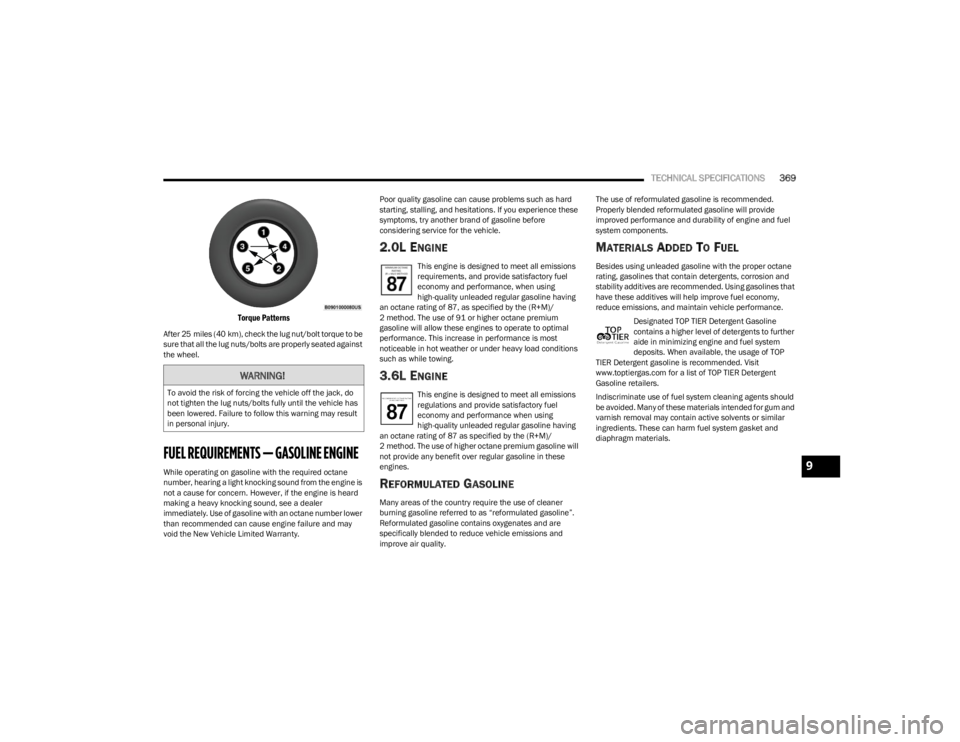
TECHNICAL SPECIFICATIONS369
Torque Patterns
After 25 miles (40 km), check the lug nut/bolt torque to be
sure that all the lug nuts/bolts are properly seated against
the wheel.
FUEL REQUIREMENTS â GASOLINE ENGINE
While operating on gasoline with the required octane
number, hearing a light knocking sound from the engine is
not a cause for concern. However, if the engine is heard
making a heavy knocking sound, see a dealer
immediately. Use of gasoline with an octane number lower
than recommended can cause engine failure and may
void the New Vehicle Limited Warranty. Poor quality gasoline can cause problems such as hard
starting, stalling, and hesitations. If you experience these
symptoms, try another brand of gasoline before
considering service for the vehicle.
2.0L ENGINE
This engine is designed to meet all emissions
requirements, and provide satisfactory fuel
economy and performance, when using
high-quality unleaded regular gasoline having
an octane rating of 87, as specified by the (R+M)/
2 method. The use of 91 or higher octane premium
gasoline will allow these engines to operate to optimal
performance. This increase in performance is most
noticeable in hot weather or under heavy load conditions
such as while towing.
3.6L ENGINE
This engine is designed to meet all emissions
regulations and provide satisfactory fuel
economy and performance when using
high-quality unleaded regular gasoline having
an octane rating of 87 as specified by the (R+M)/
2 method. The use of higher octane premium gasoline will
not provide any benefit over regular gasoline in these
engines.
REFORMULATED GASOLINE
Many areas of the country require the use of cleaner
burning gasoline referred to as âreformulated gasolineâ.
Reformulated gasoline contains oxygenates and are
specifically blended to reduce vehicle emissions and
improve air quality. The use of reformulated gasoline is recommended.
Properly blended reformulated gasoline will provide
improved performance and durability of engine and fuel
system components.
MATERIALS ADDED TO FUEL
Besides using unleaded gasoline with the proper octane
rating, gasolines that contain detergents, corrosion and
stability additives are recommended. Using gasolines that
have these additives will help improve fuel economy,
reduce emissions, and maintain vehicle performance.
Designated TOP TIER Detergent Gasoline
contains a higher level of detergents to further
aide in minimizing engine and fuel system
deposits. When available, the usage of TOP
TIER Detergent gasoline is recommended. Visit
www.toptiergas.com for a list of TOP TIER Detergent
Gasoline retailers.
Indiscriminate use of fuel system cleaning agents should
be avoided. Many of these materials intended for gum and
varnish removal may contain active solvents or similar
ingredients. These can harm fuel system gasket and
diaphragm materials.
WARNING!
To avoid the risk of forcing the vehicle off the jack, do
not tighten the lug nuts/bolts fully until the vehicle has
been lowered. Failure to follow this warning may result
in personal injury.
9
23_JL_OM_EN_USC_t.book Page 369
Page 372 of 396
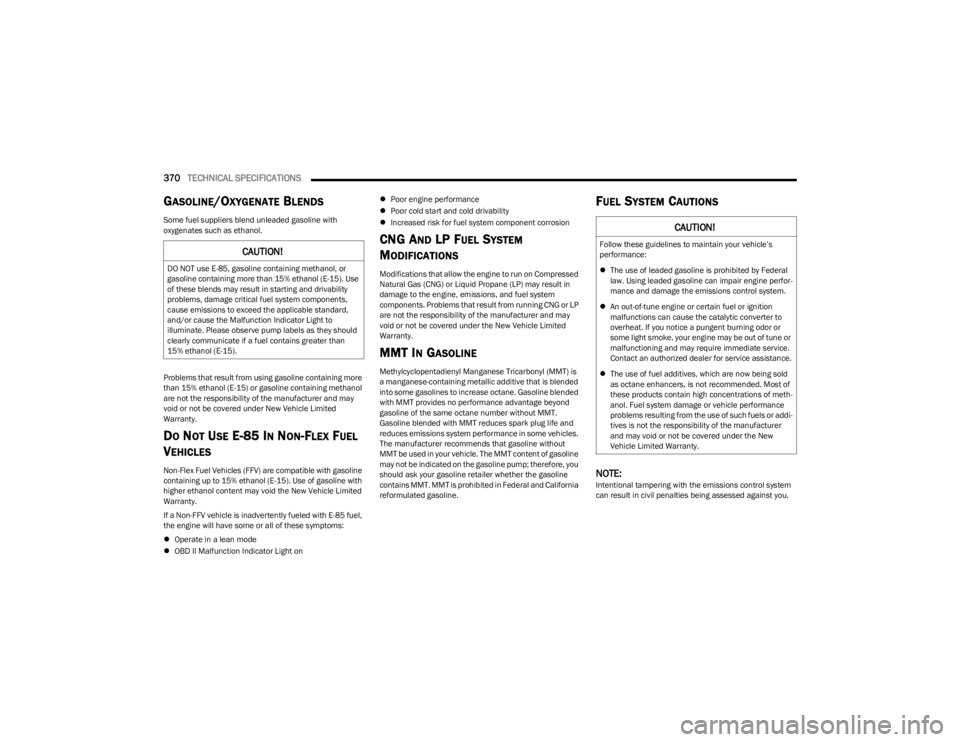
370TECHNICAL SPECIFICATIONS
GASOLINE/OXYGENATE BLENDS
Some fuel suppliers blend unleaded gasoline with
oxygenates such as ethanol.
Problems that result from using gasoline containing more
than 15% ethanol (E-15) or gasoline containing methanol
are not the responsibility of the manufacturer and may
void or not be covered under New Vehicle Limited
Warranty.
DO NOT USE E-85 IN NON-FLEX FUEL
V
EHICLES
Non-Flex Fuel Vehicles (FFV) are compatible with gasoline
containing up to 15% ethanol (E-15). Use of gasoline with
higher ethanol content may void the New Vehicle Limited
Warranty.
If a Non-FFV vehicle is inadvertently fueled with E-85 fuel,
the engine will have some or all of these symptoms:
ï¬ Operate in a lean mode
ï¬ OBD II Malfunction Indicator Light on ï¬
Poor engine performance
ï¬ Poor cold start and cold drivability
ï¬ Increased risk for fuel system component corrosion
CNG AND LP FUEL SYSTEM
M
ODIFICATIONS
Modifications that allow the engine to run on Compressed
Natural Gas (CNG) or Liquid Propane (LP) may result in
damage to the engine, emissions, and fuel system
components. Problems that result from running CNG or LP
are not the responsibility of the manufacturer and may
void or not be covered under the New Vehicle Limited
Warranty.
MMT IN GASOLINE
Methylcyclopentadienyl Manganese Tricarbonyl (MMT) is
a manganese-containing metallic additive that is blended
into some gasolines to increase octane. Gasoline blended
with MMT provides no performance advantage beyond
gasoline of the same octane number without MMT.
Gasoline blended with MMT reduces spark plug life and
reduces emissions system performance in some vehicles.
The manufacturer recommends that gasoline without
MMT be used in your vehicle. The MMT content of gasoline
may not be indicated on the gasoline pump; therefore, you
should ask your gasoline retailer whether the gasoline
contains MMT. MMT is prohibited in Federal and California
reformulated gasoline.
FUEL SYSTEM CAUTIONS
NOTE:Intentional tampering with the emissions control system
can result in civil penalties being assessed against you.
CAUTION!
DO NOT use E-85, gasoline containing methanol, or
gasoline containing more than 15% ethanol (E-15). Use
of these blends may result in starting and drivability
problems, damage critical fuel system components,
cause emissions to exceed the applicable standard,
and/or cause the Malfunction Indicator Light to
illuminate. Please observe pump labels as they should
clearly communicate if a fuel contains greater than
15% ethanol (E-15).
CAUTION!
Follow these guidelines to maintain your vehicleâs
performance:
ï¬ The use of leaded gasoline is prohibited by Federal
law. Using leaded gasoline can impair engine perfor -
mance and damage the emissions control system.
ï¬ An out-of-tune engine or certain fuel or ignition
malfunctions can cause the catalytic converter to
overheat. If you notice a pungent burning odor or
some light smoke, your engine may be out of tune or
malfunctioning and may require immediate service.
Contact an authorized dealer for service assistance.
ï¬ The use of fuel additives, which are now being sold
as octane enhancers, is not recommended. Most of
these products contain high concentrations of meth -
anol. Fuel system damage or vehicle performance
problems resulting from the use of such fuels or addi -
tives is not the responsibility of the manufacturer
and may void or not be covered under the New
Vehicle Limited Warranty.
23_JL_OM_EN_USC_t.book Page 370
Page 373 of 396
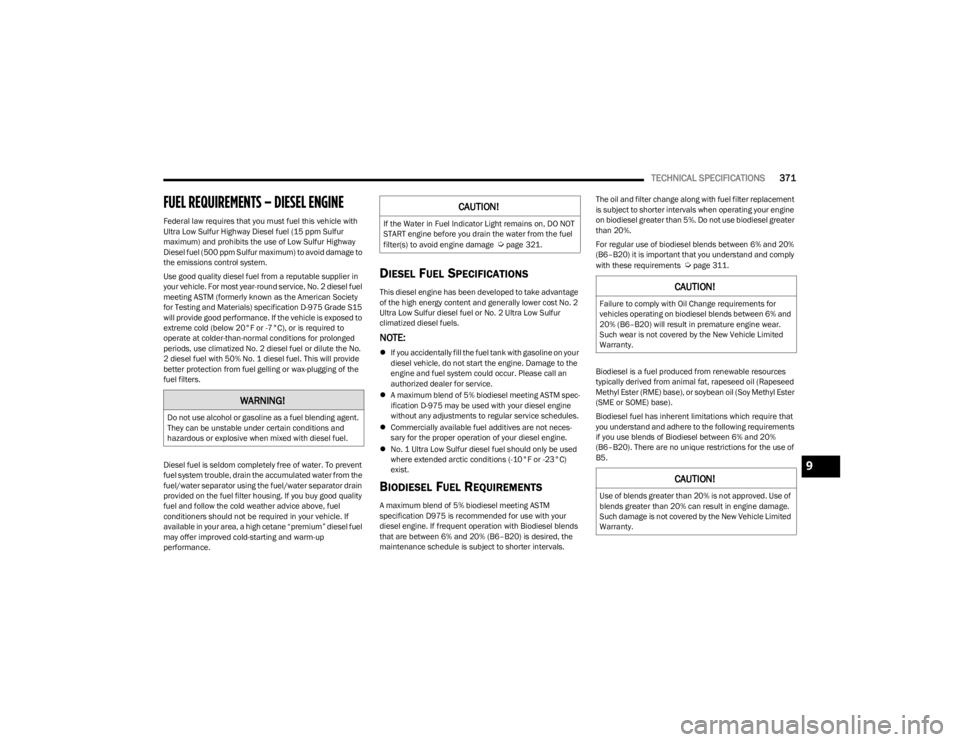
TECHNICAL SPECIFICATIONS371
FUEL REQUIREMENTS â DIESEL ENGINE
Federal law requires that you must fuel this vehicle with
Ultra Low Sulfur Highway Diesel fuel (15 ppm Sulfur
maximum) and prohibits the use of Low Sulfur Highway
Diesel fuel (500 ppm Sulfur maximum) to avoid damage to
the emissions control system.
Use good quality diesel fuel from a reputable supplier in
your vehicle. For most year-round service, No. 2 diesel fuel
meeting ASTM (formerly known as the American Society
for Testing and Materials) specification D-975 Grade S15
will provide good performance. If the vehicle is exposed to
extreme cold (below 20°F or -7°C), or is required to
operate at colder-than-normal conditions for prolonged
periods, use climatized No. 2 diesel fuel or dilute the No.
2 diesel fuel with 50% No. 1 diesel fuel. This will provide
better protection from fuel gelling or wax-plugging of the
fuel filters.
Diesel fuel is seldom completely free of water. To prevent
fuel system trouble, drain the accumulated water from the
fuel/water separator using the fuel/water separator drain
provided on the fuel filter housing. If you buy good quality
fuel and follow the cold weather advice above, fuel
conditioners should not be required in your vehicle. If
available in your area, a high cetane âpremiumâ diesel fuel
may offer improved cold-starting and warm-up
performance.
DIESEL FUEL SPECIFICATIONS
This diesel engine has been developed to take advantage
of the high energy content and generally lower cost No. 2
Ultra Low Sulfur diesel fuel or No. 2 Ultra Low Sulfur
climatized diesel fuels.
NOTE:
ï¬If you accidentally fill the fuel tank with gasoline on your
diesel vehicle, do not start the engine. Damage to the
engine and fuel system could occur. Please call an
authorized dealer for service.
ï¬ A maximum blend of 5% biodiesel meeting ASTM spec -
ification D-975 may be used with your diesel engine
without any adjustments to regular service schedules.
ï¬ Commercially available fuel additives are not neces -
sary for the proper operation of your diesel engine.
ï¬ No. 1 Ultra Low Sulfur diesel fuel should only be used
where extended arctic conditions (-10°F or -23°C)
exist.
BIODIESEL FUEL REQUIREMENTS
A maximum blend of 5% biodiesel meeting ASTM
specification D975 is recommended for use with your
diesel engine. If frequent operation with Biodiesel blends
that are between 6% and 20% (B6âB20) is desired, the
maintenance schedule is subject to shorter intervals. The oil and filter change along with fuel filter replacement
is subject to shorter intervals when operating your engine
on biodiesel greater than 5%. Do not use biodiesel greater
than 20%.
For regular use of biodiesel blends between 6% and 20%
(B6âB20) it is important that you understand and comply
with these requirements
Ãpage 311.
Biodiesel is a fuel produced from renewable resources
typically derived from animal fat, rapeseed oil (Rapeseed
Methyl Ester (RME) base), or soybean oil (Soy Methyl Ester
(SME or SOME) base).
Biodiesel fuel has inherent limitations which require that
you understand and adhere to the following requirements
if you use blends of Biodiesel between 6% and 20%
(B6âB20). There are no unique restrictions for the use of
B5.
WARNING!
Do not use alcohol or gasoline as a fuel blending agent.
They can be unstable under certain conditions and
hazardous or explosive when mixed with diesel fuel.
CAUTION!
If the Water in Fuel Indicator Light remains on, DO NOT
START engine before you drain the water from the fuel
filter(s) to avoid engine damage
Ãpage 321.
CAUTION!
Failure to comply with Oil Change requirements for
vehicles operating on biodiesel blends between 6% and
20% (B6âB20) will result in premature engine wear.
Such wear is not covered by the New Vehicle Limited
Warranty.
CAUTION!
Use of blends greater than 20% is not approved. Use of
blends greater than 20% can result in engine damage.
Such damage is not covered by the New Vehicle Limited
Warranty.
9
23_JL_OM_EN_USC_t.book Page 371
Page 374 of 396
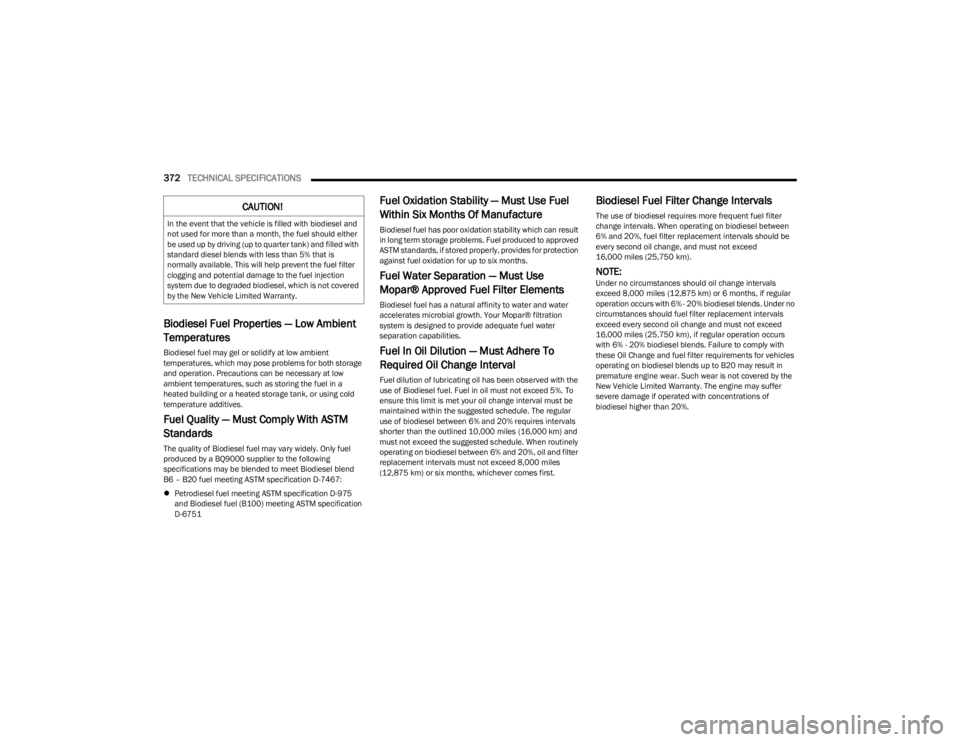
372TECHNICAL SPECIFICATIONS
Biodiesel Fuel Properties â Low Ambient
Temperatures
Biodiesel fuel may gel or solidify at low ambient
temperatures, which may pose problems for both storage
and operation. Precautions can be necessary at low
ambient temperatures, such as storing the fuel in a
heated building or a heated storage tank, or using cold
temperature additives.
Fuel Quality â Must Comply With ASTM
Standards
The quality of Biodiesel fuel may vary widely. Only fuel
produced by a BQ9000 supplier to the following
specifications may be blended to meet Biodiesel blend
B6 â B20 fuel meeting ASTM specification D-7467:
ï¬Petrodiesel fuel meeting ASTM specification D-975
and Biodiesel fuel (B100) meeting ASTM specification
D-6751
Fuel Oxidation Stability â Must Use Fuel
Within Six Months Of Manufacture
Biodiesel fuel has poor oxidation stability which can result
in long term storage problems. Fuel produced to approved
ASTM standards, if stored properly, provides for protection
against fuel oxidation for up to six months.
Fuel Water Separation â Must Use
Mopar® Approved Fuel Filter Elements
Biodiesel fuel has a natural affinity to water and water
accelerates microbial growth. Your Mopar® filtration
system is designed to provide adequate fuel water
separation capabilities.
Fuel In Oil Dilution â Must Adhere To
Required Oil Change Interval
Fuel dilution of lubricating oil has been observed with the
use of Biodiesel fuel. Fuel in oil must not exceed 5%. To
ensure this limit is met your oil change interval must be
maintained within the suggested schedule. The regular
use of biodiesel between 6% and 20% requires intervals
shorter than the outlined 10,000 miles (16,000 km) and
must not exceed the suggested schedule. When routinely
operating on biodiesel between 6% and 20%, oil and filter
replacement intervals must not exceed 8,000 miles
(12,875 km) or six months, whichever comes first.
Biodiesel Fuel Filter Change Intervals
The use of biodiesel requires more frequent fuel filter
change intervals. When operating on biodiesel between
6% and 20%, fuel filter replacement intervals should be
every second oil change, and must not exceed
16,000 miles (25,750 km).
NOTE:Under no circumstances should oil change intervals
exceed 8,000 miles (12,875 km) or 6 months, if regular
operation occurs with 6% - 20% biodiesel blends. Under no
circumstances should fuel filter replacement intervals
exceed every second oil change and must not exceed
16,000 miles (25,750 km), if regular operation occurs
with 6% - 20% biodiesel blends. Failure to comply with
these Oil Change and fuel filter requirements for vehicles
operating on biodiesel blends up to B20 may result in
premature engine wear. Such wear is not covered by the
New Vehicle Limited Warranty. The engine may suffer
severe damage if operated with concentrations of
biodiesel higher than 20%.
CAUTION!
In the event that the vehicle is filled with biodiesel and
not used for more than a month, the fuel should either
be used up by driving (up to quarter tank) and filled with
standard diesel blends with less than 5% that is
normally available. This will help prevent the fuel filter
clogging and potential damage to the fuel injection
system due to degraded biodiesel, which is not covered
by the New Vehicle Limited Warranty.
23_JL_OM_EN_USC_t.book Page 372
Page 375 of 396
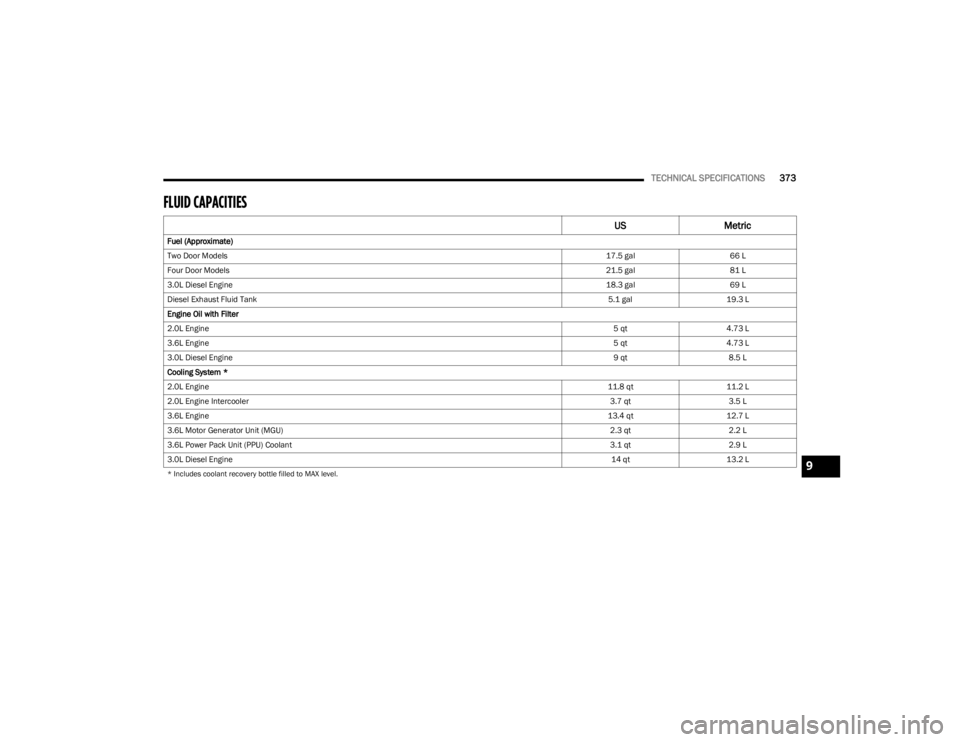
TECHNICAL SPECIFICATIONS373
FLUID CAPACITIES
USMetric
Fuel (Approximate)
Two Door Models 17.5 gal66 L
Four Door Models 21.5 gal81 L
3.0L Diesel Engine 18.3 gal69 L
Diesel Exhaust Fluid Tank 5.1 gal19.3 L
Engine Oil with Filter
2.0L Engine 5 qt4.73 L
3.6L Engine 5 qt4.73 L
3.0L Diesel Engine 9 qt8.5 L
Cooling System *
2.0L Engine 11.8 qt11.2 L
2.0L Engine Intercooler 3.7 qt3.5 L
3.6L Engine 13.4 qt12.7 L
3.6L Motor Generator Unit (MGU) 2.3 qt2.2 L
3.6L Power Pack Unit (PPU) Coolant 3.1 qt2.9 L
3.0L Diesel Engine 14 qt13.2 L
* Includes coolant recovery bottle filled to MAX level.9
23_JL_OM_EN_USC_t.book Page 373
Page 376 of 396
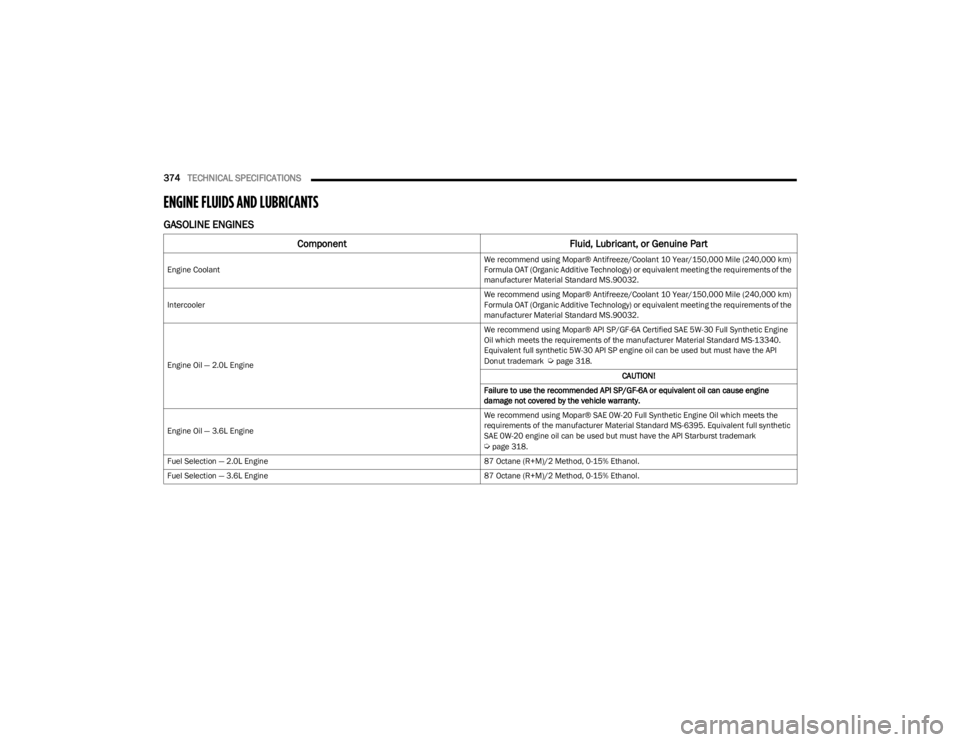
374TECHNICAL SPECIFICATIONS
ENGINE FLUIDS AND LUBRICANTS
GASOLINE ENGINES
Component Fluid, Lubricant, or Genuine Part
Engine Coolant
We recommend using Mopar® Antifreeze/Coolant 10 Year/150,000 Mile (240,000 km)
Formula OAT (Organic Additive Technology) or equivalent meeting the requirements of the
manufacturer Material Standard MS.90032.
Intercooler We recommend using Mopar® Antifreeze/Coolant 10 Year/150,000 Mile (240,000 km)
Formula OAT (Organic Additive Technology) or equivalent meeting the requirements of the
manufacturer Material Standard MS.90032.
Engine Oil â 2.0L Engine We recommend using Mopar® API SP/GF-6A Certified SAE 5W-30 Full Synthetic Engine
Oil which meets the requirements of the manufacturer Material Standard MS-13340.
Equivalent full synthetic 5W-30 API SP engine oil can be used but must have the API
Donut trademark
Ãpage 318.
CAUTION!
Failure to use the recommended API SP/GF-6A or equivalent oil can cause engine
damage not covered by the vehicle warranty.
Engine Oil â 3.6L Engine We recommend using Mopar® SAE 0W-20 Full Synthetic Engine Oil which meets the
requirements of the manufacturer Material Standard MS-6395. Equivalent full synthetic
SAE 0W-20 engine oil can be used but must have the API Starburst trademark
Ãpage 318.
Fuel Selection â 2.0L Engine 87 Octane (R+M)/2 Method, 0-15% Ethanol.
Fuel Selection â 3.6L Engine 87 Octane (R+M)/2 Method, 0-15% Ethanol.
23_JL_OM_EN_USC_t.book Page 374
Page 377 of 396
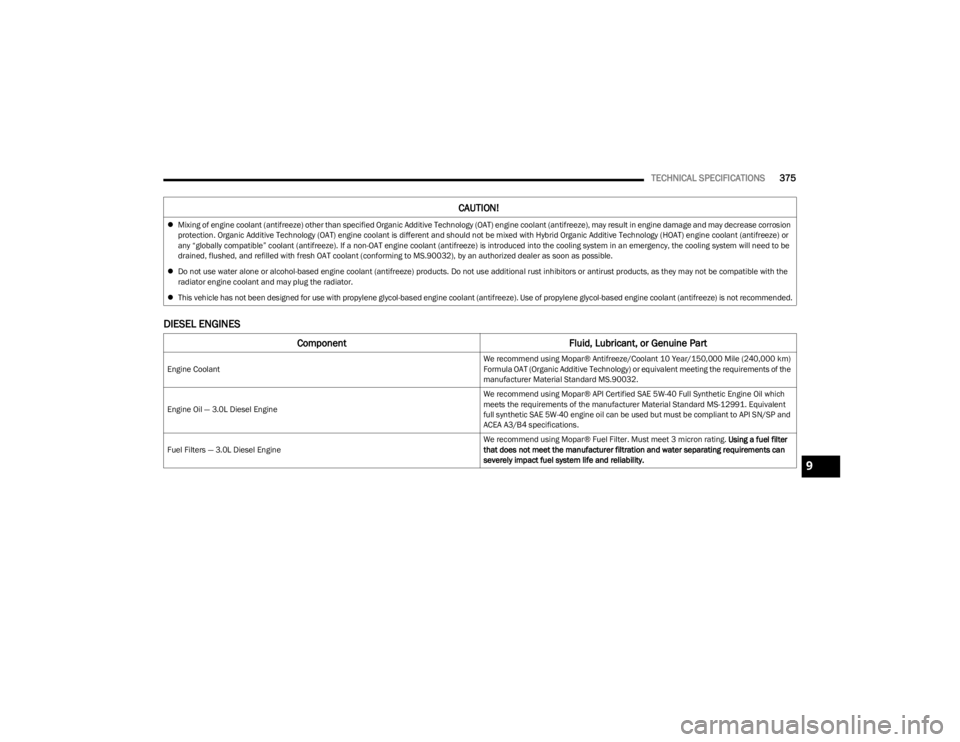
TECHNICAL SPECIFICATIONS375
DIESEL ENGINES
CAUTION!
ï¬Mixing of engine coolant (antifreeze) other than specified Organic Additive Technology (OAT) engine coolant (antifreeze), may result in engine damage and may decrease corrosion
protection. Organic Additive Technology (OAT) engine coolant is different and should not be mixed with Hybrid Organic Additive Technology (HOAT) engine coolant (antifreeze) or
any âglobally compatibleâ coolant (antifreeze). If a non-OAT engine coolant (antifreeze) is introduced into the cooling system in an emergency, the cooling system will need to be
drained, flushed, and refilled with fresh OAT coolant (conforming to MS.90032), by an authorized dealer as soon as possible.
ï¬ Do not use water alone or alcohol-based engine coolant (antifreeze) products. Do not use additional rust inhibitors or antirust products, as they may not be compatible with the
radiator engine coolant and may plug the radiator.
ï¬ This vehicle has not been designed for use with propylene glycol-based engine coolant (antifreeze). Use of propylene glycol-based engine coolant (antifreeze) is not recommended.
Component Fluid, Lubricant, or Genuine Part
Engine Coolant We recommend using Mopar® Antifreeze/Coolant 10 Year/150,000 Mile (240,000 km)
Formula OAT (Organic Additive Technology) or equivalent meeting the requirements of the
manufacturer Material Standard MS.90032.
Engine Oil â 3.0L Diesel Engine We recommend using Mopar® API Certified SAE 5W-40 Full Synthetic Engine Oil which
meets the requirements of the manufacturer Material Standard MS-12991. Equivalent
full synthetic SAE 5W-40 engine oil can be used but must be compliant to API SN/SP and
ACEA A3/B4 specifications.
Fuel Filters â 3.0L Diesel Engine We recommend using Mopar® Fuel Filter. Must meet 3 micron rating.
Using a fuel filter
that does not meet the manufacturer filtration and water separating requirements can
severely impact fuel system life and reliability.
9
23_JL_OM_EN_USC_t.book Page 375
Page 378 of 396
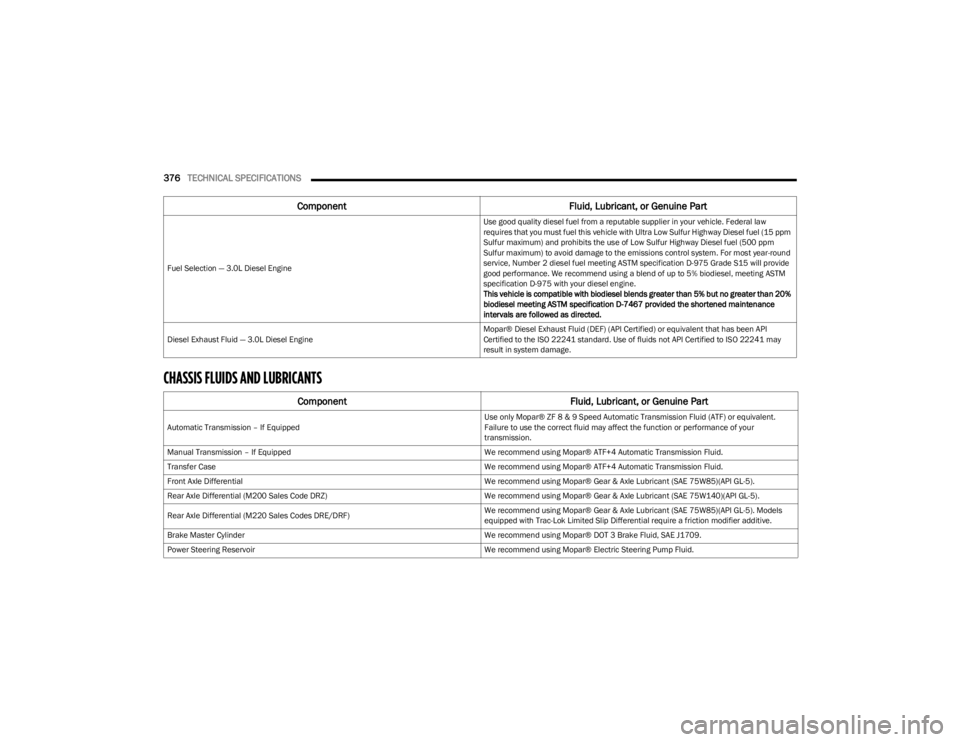
376TECHNICAL SPECIFICATIONS
CHASSIS FLUIDS AND LUBRICANTS
Fuel Selection â 3.0L Diesel Engine Use good quality diesel fuel from a reputable supplier in your vehicle. Federal law
requires that you must fuel this vehicle with Ultra Low Sulfur Highway Diesel fuel (15 ppm
Sulfur maximum) and prohibits the use of Low Sulfur Highway Diesel fuel (500 ppm
Sulfur maximum) to avoid damage to the emissions control system. For most year-round
service, Number 2 diesel fuel meeting ASTM specification D-975 Grade S15 will provide
good performance. We recommend using a blend of up to 5% biodiesel, meeting ASTM
specification D-975 with your diesel engine.
This vehicle is compatible with biodiesel blends greater than 5% but no greater than 20%
biodiesel meeting ASTM specification D-7467 provided the shortened maintenance
intervals are followed as directed.
Diesel Exhaust Fluid â 3.0L Diesel Engine Mopar® Diesel Exhaust Fluid (DEF) (API Certified) or equivalent that has been API
Certified to the ISO 22241 standard. Use of fluids not API Certified to ISO 22241 may
result in system damage.
Component
Fluid, Lubricant, or Genuine Part
Automatic Transmission â If Equipped Use only Mopar® ZF 8 & 9 Speed Automatic Transmission Fluid (ATF) or equivalent.
Failure to use the correct fluid may affect the function or performance of your
transmission.
Manual Transmission â If Equipped We recommend using Mopar® ATF+4 Automatic Transmission Fluid.
Transfer Case We recommend using Mopar® ATF+4 Automatic Transmission Fluid.
Front Axle Differential We recommend using Mopar® Gear & Axle Lubricant (SAE 75W85)(API GL-5).
Rear Axle Differential (M200 Sales Code DRZ) We recommend using Mopar® Gear & Axle Lubricant (SAE 75W140)(API GL-5).
Rear Axle Differential (M220 Sales Codes DRE/DRF) We recommend using Mopar® Gear & Axle Lubricant (SAE 75W85)(API GL-5). Models
equipped with Trac-Lok Limited Slip Differential require a friction modifier additive.
Brake Master Cylinder We recommend using Mopar® DOT 3 Brake Fluid, SAE J1709.
Power Steering Reservoir We recommend using Mopar® Electric Steering Pump Fluid.
ComponentFluid, Lubricant, or Genuine Part
23_JL_OM_EN_USC_t.book Page 376
Page 379 of 396
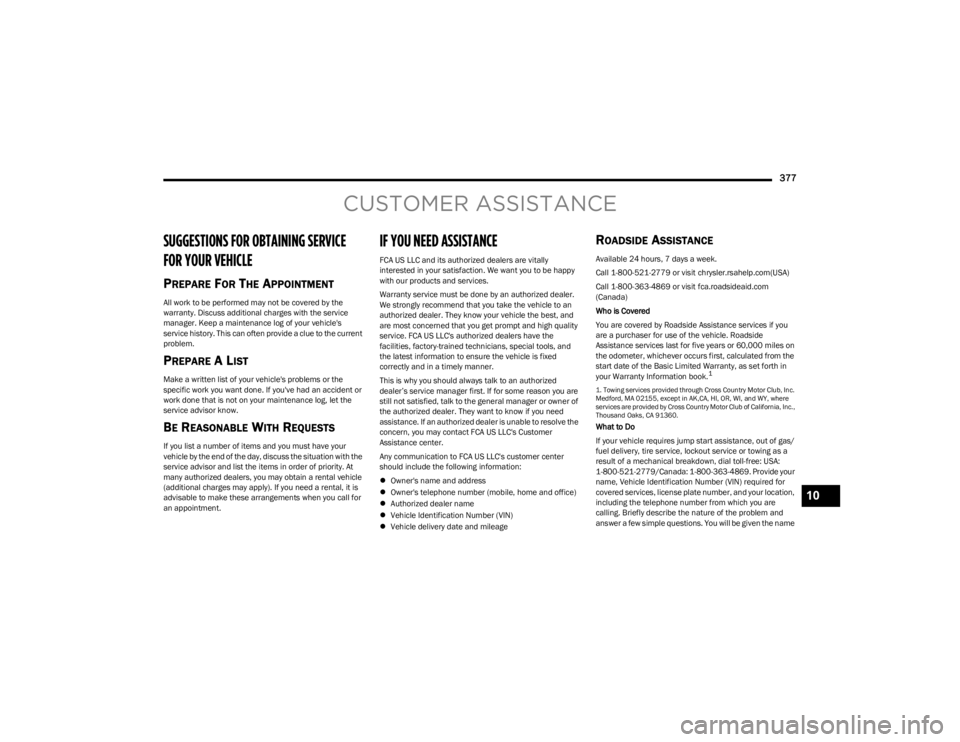
377
CUSTOMER ASSISTANCE
SUGGESTIONS FOR OBTAINING SERVICE
FOR YOUR VEHICLE
PREPARE FOR THE APPOINTMENT
All work to be performed may not be covered by the
warranty. Discuss additional charges with the service
manager. Keep a maintenance log of your vehicle's
service history. This can often provide a clue to the current
problem.
PREPARE A LIST
Make a written list of your vehicle's problems or the
specific work you want done. If you've had an accident or
work done that is not on your maintenance log, let the
service advisor know.
BE REASONABLE WITH REQUESTS
If you list a number of items and you must have your
vehicle by the end of the day, discuss the situation with the
service advisor and list the items in order of priority. At
many authorized dealers, you may obtain a rental vehicle
(additional charges may apply). If you need a rental, it is
advisable to make these arrangements when you call for
an appointment.
IF YOU NEED ASSISTANCE
FCA US LLC and its authorized dealers are vitally
interested in your satisfaction. We want you to be happy
with our products and services.
Warranty service must be done by an authorized dealer.
We strongly recommend that you take the vehicle to an
authorized dealer. They know your vehicle the best, and
are most concerned that you get prompt and high quality
service. FCA US LLC's authorized dealers have the
facilities, factory-trained technicians, special tools, and
the latest information to ensure the vehicle is fixed
correctly and in a timely manner.
This is why you should always talk to an authorized
dealerâs service manager first. If for some reason you are
still not satisfied, talk to the general manager or owner of
the authorized dealer. They want to know if you need
assistance. If an authorized dealer is unable to resolve the
concern, you may contact FCA US LLC's Customer
Assistance center.
Any communication to FCA US LLC's customer center
should include the following information:
ï¬Owner's name and address
ï¬ Owner's telephone number (mobile, home and office)
ï¬ Authorized dealer name
ï¬ Vehicle Identification Number (VIN)
ï¬ Vehicle delivery date and mileage
ROADSIDE ASSISTANCE
Available 24 hours, 7 days a week.
Call 1-800-521-2779 or visit chrysler.rsahelp.com(USA)
Call 1-800-363-4869 or visit fca.roadsideaid.com
(Canada)
Who is Covered
You are covered by Roadside Assistance services if you
are a purchaser for use of the vehicle. Roadside
Assistance services last for five years or 60,000 miles on
the odometer, whichever occurs first, calculated from the
start date of the Basic Limited Warranty, as set forth in
your Warranty Information book.
1
1. Towing services provided through Cross Country Motor Club, Inc.
Medford, MA 02155, except in AK,CA, HI, OR, WI, and WY, where
services are provided by Cross Country Motor Club of California, Inc.,
Thousand Oaks, CA 91360.
What to Do
If your vehicle requires jump start assistance, out of gas/
fuel delivery, tire service, lockout service or towing as a
result of a mechanical breakdown, dial toll-free: USA:
1-800-521-2779/Canada: 1-800-363-4869. Provide your
name, Vehicle Identification Number (VIN) required for
covered services, license plate number, and your location,
including the telephone number from which you are
calling. Briefly describe the nature of the problem and
answer a few simple questions. You will be given the name
10
23_JL_OM_EN_USC_t.book Page 377
Page 380 of 396
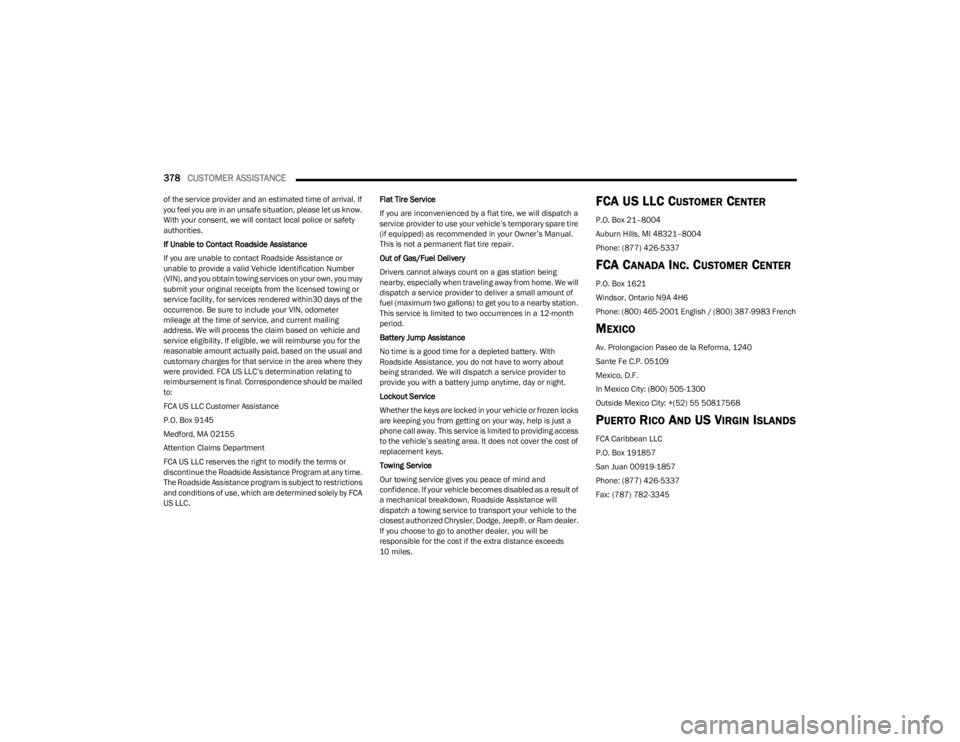
378CUSTOMER ASSISTANCE
of the service provider and an estimated time of arrival. If
you feel you are in an unsafe situation, please let us know.
With your consent, we will contact local police or safety
authorities.
If Unable to Contact Roadside Assistance
If you are unable to contact Roadside Assistance or
unable to provide a valid Vehicle Identification Number
(VIN), and you obtain towing services on your own, you may
submit your original receipts from the licensed towing or
service facility, for services rendered within30 days of the
occurrence. Be sure to include your VIN, odometer
mileage at the time of service, and current mailing
address. We will process the claim based on vehicle and
service eligibility. If eligible, we will reimburse you for the
reasonable amount actually paid, based on the usual and
customary charges for that service in the area where they
were provided. FCA US LLCâs determination relating to
reimbursement is final. Correspondence should be mailed
to:
FCA US LLC Customer Assistance
P.O. Box 9145
Medford, MA 02155
Attention Claims Department
FCA US LLC reserves the right to modify the terms or
discontinue the Roadside Assistance Program at any time.
The Roadside Assistance program is subject to restrictions
and conditions of use, which are determined solely by FCA
US LLC. Flat Tire Service
If you are inconvenienced by a flat tire, we will dispatch a
service provider to use your vehicleâs temporary spare tire
(if equipped) as recommended in your Ownerâs Manual.
This is not a permanent flat tire repair.
Out of Gas/Fuel Delivery
Drivers cannot always count on a gas station being
nearby, especially when traveling away from home. We will
dispatch a service provider to deliver a small amount of
fuel (maximum two gallons) to get you to a nearby station.
This service is limited to two occurrences in a 12-month
period.
Battery Jump Assistance
No time is a good time for a depleted battery. With
Roadside Assistance, you do not have to worry about
being stranded. We will dispatch a service provider to
provide you with a battery jump anytime, day or night.
Lockout Service
Whether the keys are locked in your vehicle or frozen locks
are keeping you from getting on your way, help is just a
phone call away. This service is limited to providing access
to the vehicleâs seating area. It does not cover the cost of
replacement keys.
Towing Service
Our towing service gives you peace of mind and
confidence. If your vehicle becomes disabled as a result of
a mechanical breakdown, Roadside Assistance will
dispatch a towing service to transport your vehicle to the
closest authorized Chrysler, Dodge, Jeep®, or Ram dealer.
If you choose to go to another dealer, you will be
responsible for the cost if the extra distance exceeds
10 miles.FCA U S LLC CUSTOMER CENTER
P.O. Box 21â8004
Auburn Hills, MI 48321â8004
Phone: (877) 426-5337
FCA CANADA INC. CUSTOMER CENTER
P.O. Box 1621
Windsor, Ontario N9A 4H6
Phone: (800) 465-2001 English / (800) 387-9983 French
MEXICO
Av. Prolongacion Paseo de la Reforma, 1240
Sante Fe C.P. 05109
Mexico, D.F.
In Mexico City: (800) 505-1300
Outside Mexico City: +(52) 55 50817568
PUERTO RICO AND US VIRGIN ISLANDS
FCA Caribbean LLC
P.O. Box 191857
San Juan 00919-1857
Phone: (877) 426-5337
Fax: (787) 782-3345
23_JL_OM_EN_USC_t.book Page 378